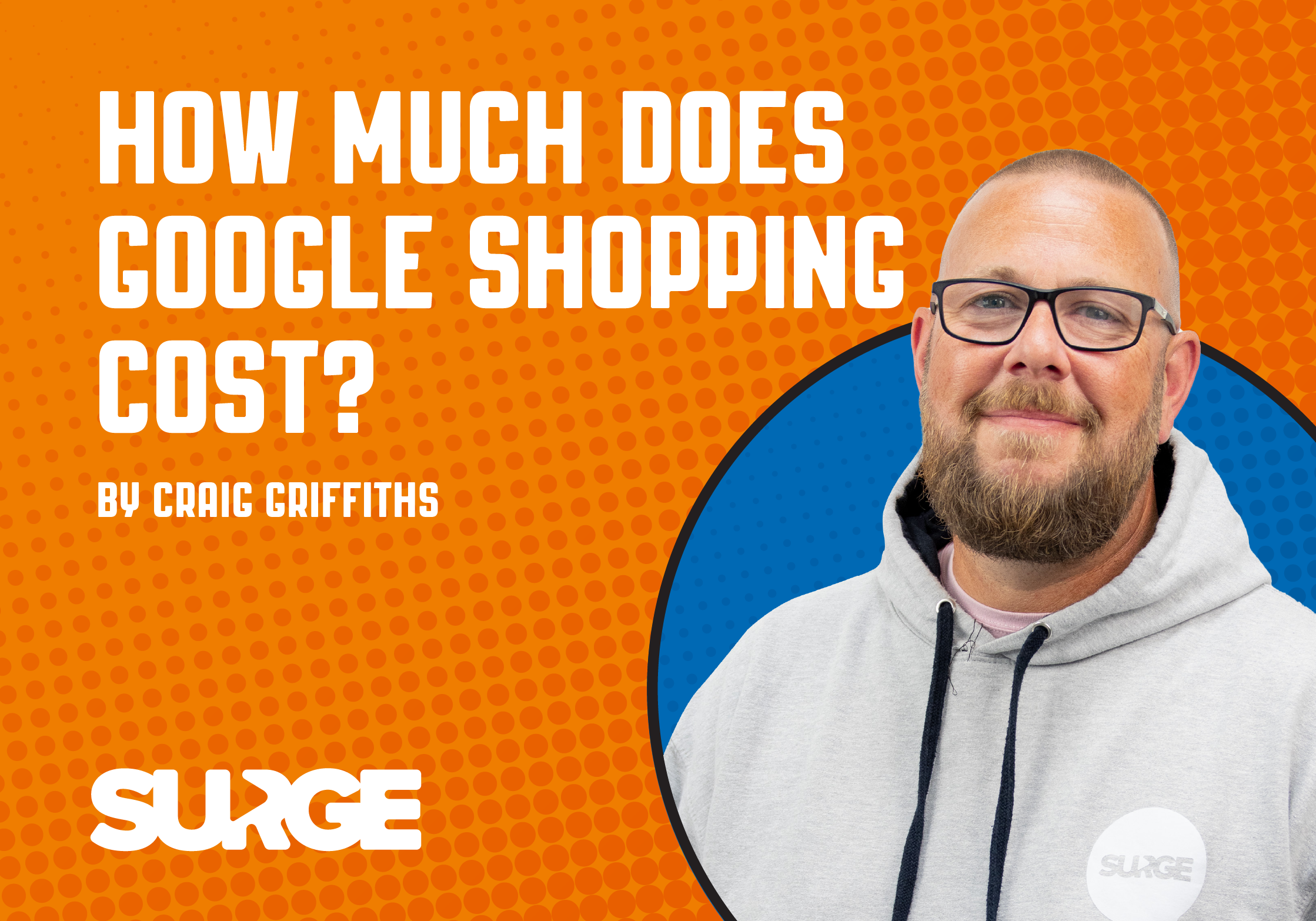
If you’re an eCommerce business looking to scale, it’s probably one of the first questions you’ll ask: How much does Google Shopping cost?
And while it’d be nice if there were a simple, flat answer, there isn’t.
That’s because Google Shopping campaigns don’t work on a fixed fee model.
You’re not paying to be listed, you’re bidding to appear, and paying only when someone clicks.
It’s a pay-per-click (PPC) model, which means your actual cost depends on the product, the setup, the market, and how well your campaign is managed.
But here’s what you need to know to budget smarter.
What Determines Your Google Shopping Cost?
Whether you're a small retailer or a seven-figure brand, four key factors will shape how much you pay, and how much you get back.
1. Your Product Category
Not all clicks are created equal.
A click on a pair of shoelaces might cost £0.20. A click on a high-end laptop might cost £3+.
Why? Because the potential return is drastically different.
Tech, homeware, appliances, and fashion tend to be more competitive, and pricier, especially when margins are high and buyer intent is strong.
2. Market Competition
Google Shopping ads don’t operate in a vacuum.
If ten retailers are bidding on the same item, Google picks winners based on:
Bid amount
Relevance and quality of your product feed
Landing page experience
Historical performance
So it’s not just about budget, it’s about setup.
A cheaper, better-optimised campaign can out-rank a more expensive but poorly run one.
3. Your Daily Budget
With Google Shopping, you’re always in control.
You set a daily cap, say £20/day.
Once that’s spent, your ads stop showing.
This helps avoid overspend, but it also affects your visibility.
If your budget is too low, your ads might stop showing before peak shopping hours.
If it’s high without the right structure, you’ll waste spend on low-converting clicks.
4. Campaign Quality & Feed Setup
Google’s algorithm favours quality. That means:
Clear, keyword-rich titles
Accurate and detailed descriptions
High-res product imagery
Correct categorisation and pricing
Well-structured feeds
If you neglect these? You’ll either pay more, or worse, not show up at all.
So... How Much Does Google Shopping Actually Cost?
It varies by industry and product.
Vague, we know, but that’s why we carry out research before making a recommendation.
Typically, most brands we work with start around £1,000/month.
That gives the campaign enough room to collect data, test strategies, and scale intelligently.
Less than that, and you’re not giving the algorithm the fuel it needs to work.
Is Google Shopping Worth the Investment?
When your Google Shopping ads are properly set up, it’s one of the highest-performing PPC channels available.
Why? Because these aren’t passive browsers.
People clicking these ads are already comparing prices, checking specs, and ready to buy.
They’re high-intent, bottom-of-funnel users.
But, and it’s a big but, if your campaign is sloppy, your feed messy, or your budget misaligned, it becomes a money pit fast.
Imagine turning up to a trade fair with blurry photos, no price tags, and stock you can’t deliver.
People will walk past, or worse, click and bounce, draining your budget with nothing to show for it.
How to Maximise Your Google Shopping Budget
Want to make every click count? Here's what we recommend:
✅ Get your feed right
Use clear, keyword-driven titles
Include accurate specs and rich descriptions
Upload clean, high-quality images
Ensure all required data (price, availability, GTINs) is filled in
✅ Start small — then scale
Begin with a budget that allows you to be competitive without breaking the bank to test what works. Once you’ve got a profitable campaign, increase budget and expand product ranges.
✅ Monitor more than clicks
Don’t obsess over click volume. Focus on what matters: ROAS (Return on Ad Spend), conversion rate, and actual profit.
✅ Keep refining
Pause underperformers, test different product groups, improve imagery, run promotions. Treat it like a retail floor, not a billboard.
What About Management Fees?
Running a smart campaign takes more than uploading a spreadsheet.
At Surge, our Google Shopping management fee starts from £750 + VAT/month. That covers:
Full product feed optimisation
Strategic campaign build and segmentation
Conversion tracking and Google Analytics 4 setup
Weekly reviews and monthly performance reports
Testing, scaling, and return-focused management
We don’t charge a % of ad spend. We charge for time, strategy, and performance, not volume.
That means our fee stays fixed, whether you’re spending £500 or £5,000.
Final Thoughts: Is Google Shopping Right for You?
How much does Google Shopping cost? The truth is, it costs what you’re willing to invest, and how well it’s managed.
If your feed is solid, your pricing competitive, and your campaigns optimised, it can be one of the most cost-effective, high-ROI channels for eCommerce growth.
If it’s not? You’ll know quickly. And we’ll be the first to say it’s time to pivot.
Want expert help?
As a Google Shopping agency, we’ve scaled campaigns across industries, from furniture to fashion to food and drink.
If you’re ready to stop wasting budget and start building a real growth engine, let’s chat.
Get in touch with our team if you want to stop guessing and start selling.